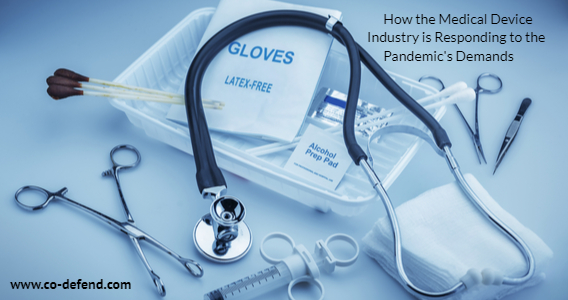The daily new cases of COVID-19 in the U.S. are reaching record-high numbers. With the number of hospitalizations hitting a new peak, the health crisis is worsening nationwide. While the pharmaceutical giant Pfizer announced the success of vaccine trials, actual mass immunization is still months away. Amid such a deadly outbreak, medical care is our only hope.
But medical care institutions across the U.S. are under the levels of strains for which they had never prepared. From care facilities to PPE distributors, everything is under unprecedented pressure. And medical equipment and the health of front-line workers are perhaps the most crucial factors at play. It makes the stakes of dealing with this pandemic incredibly high — both for government agencies and the medical care industry.
The coronavirus-induced shortages of PPE, like medical protective clothing, prompted many medical equipment manufacturers to ramp up production. However, an array of challenges like regulatory obstacles and the market’s unpredictability have repeatedly disrupted production. In the following paragraphs, we will dive deeper into how the medical device industry is responding to the disruptions triggered by the pandemic.
Regulatory Changes in the U.S.
Early in the pandemic, the U.S. federal government issued the Emergency Use Authorization rule for medical devices. Under the EUA rule, the FDA has the power to rapidly authorize the emergency use of medical equipment. However, in order to be eligible for EUA, the applicants must provide safety and efficacy-related information. Authorizations obtained under the EUA are valid only during the health crisis.
Besides, the FDA has also collaborated with a diverse range of entities, including bulk PPE suppliers in the USA, medical equipment manufacturers. These partnerships also extend to other entities such as ventilator manufacturers, respiratory device makers, and other medical industry businesses. The FDA has also released guidelines about 3D-printed PPE components.
Disrupted approvals in Europe
The regulatory approval of medical devices in the European Union is usually more sophisticated. COVID-19 has made it even worse. In the EU, medical device manufacturers need to conduct post-market clinical follow-up (PMCF) studies. These studies are aimed at demonstrating the safety and efficacy of devices for which a manufacturer seeks approval.
Since the beginning of the pandemic, health care facilities have been overwhelmed. The outbreak has delayed trials, throwing the approval process into uncertainty. Following the virus outbreak, the European Commission postponed the application date for Medical Device Regulation for one year. The move put many European medical device manufacturers into unprecedented troubles. It also significantly disrupted the PPE supply chain on the continent, with ripple effects around the world.
Unpredictable and volatile markets
While regulatory challenges persist, the unpredictable nature of the PPE market makes supply chain management more challenging. Be it masks, gloves, or medical protective clothing, PPE demands have remained astronomically high worldwide. However, the PPE market has also shown significant volatility. As regions and states experience a sudden increase in cases and flattening of the curve, PPE demands also fluctuate.
The unstable nature of the demands also makes it difficult for medical; device manufacturers and PPE distributors to forecast trends. With reliable projections, manufacturers cannot fully ramp up their production. This further slows down the PPE supply chain.
An unprepared PPE industry
The coronavirus pandemic has exposed the sheer unpreparedness of the PPE industry to deal with a medical emergency. And it’s not just the story of the PPE manufacturers in the U.S. The unpreparedness of the industry is a global story—spanning across continents and countries. The lack of a nimble policy approach across governments has made the matter even worse. Whether it’s bulk PPE suppliers in the USA or protective clothing makers in India, rigid government policies have become obstacles everywhere.
Healthcare workers around the U.S. and elsewhere in the world have faced severe shortages of PPE equipment since the beginning of the pandemic. PPE items like N95 respirators, disposable gloves, and medical protective clothing have seen profound shortages. The World Health Organization’s COVID-19 response guidelines require hospitals and government agencies to provide front-line workers with the required PPE. Countries around the world have flouted international agreements and even introduced seemingly anti-global restrictions to ensure enough supply for their health care workers. It has further damaged the global supply chain of medical devices and PPE.
Conclusion
Until the pandemic loosens its grip on the world, the role of medical devices and PPE will remain crucial. Medical device manufacturers and PPE distributors in the U.S. need to work in close coordination with healthcare providers and government agencies. At Co-Defend, we are committed to making valuable contributions to the U.S. PPE industry. We strategically collaborate with manufacturers and suppliers to ensure prompt delivery of PPE. Being one of the leading PPE suppliers in the USA, we make sure that all our clients get their delivery on time.
